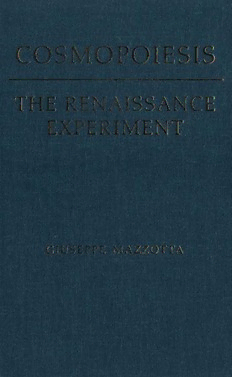
Cosmopoiesis the Renaissance experiment PDF
Preview Cosmopoiesis the Renaissance experiment
COSMOPOIESIS The Renaissance Experiment Cosmopoiesis means 'world-making,' and in this erudite, polemical book, Professor Mazzotta traces how major medieval and Renaissance thinkers invented their worlds through Utopias, magic, science, art, and theatre. The Renaissance is usually read from a Cartesian or Hegelian (via Burck- hardt) perspective. It is viewed as a time of individualities or it is studied in terms of disembodied ideas and abstract forms. Mazzotta calls for a new approach: the necessity to study the Renaissance in terms of the ongoing conversation of the arts and sciences. His is an encyclopedic grasp that takes into consideration literature, philosophy, politics, history, and theology. The book's theoretical premise lies in the thought of the eighteenth- century Italian philosopher Giambattista Vico. Vico's own reading of the Renaissance, available in his New Science, is obliquely, yet clearly, repro- posed as the alternative interpretive key for opening up the deeper imagina- tive concerns of this extraordinary period of Western history. By a series of rigorous analyses of texts by such writers as Poliziano, Ariosto, Machiavelli, Bacon, Shakespeare, and Cervantes, Cosmopoiesis high- lights the ongoing dialogue between literature and philosophy (or literature and science, or, in Vichian terms, philology and philosophy) in some of the central texts of the time. In this dialogue across time and the barriers of space, the aesthetic world - 'the world of the pastoral, romances, epics, Utopian fictions, the theatre, and the lyric' - far from signalling an evasion of history, is steadily and vitally engaged with the most pressing exigencies of the time. Consistently, the analyses conducted in Cosmopoiesis come to grips with these exigencies: the power of science, the relationship between politics and science, and the emergence of a new ethics in the midst of the secretive techniques by new elites in their exercise of political power. Above all, these central texts argue for a necessary reconstitution of the unity of knowledge, for the 'en- cyclopedic' compass of the arts and sciences. (Goggio Publication Series, Toronto Italian Studies) GIUSEPPE MAZZOTTA is Charles C. and Dorathea S. Dilley Professor of Ital- ian Literature and Culture at Yale University. TORONTO ITALIAN STUDIES gOGGIO PUBLICATION SERIES gERERAL eDITOR: oLGA zORZI pUGLIESE GIUSEPPE MAZZOTTA COSMOPOIESIS The Renaissance Experiment UNIVERSITY OF TORONTO PRESS Toronto Buffalo London www.utppublishing.com University of Toronto Press Incorporated 2001 Toronto Buffalo London Printed in Canada ISBN 0-8020-3551-5 (cloth) ISBN 0-8020-8421-4 (paper) Printed on acid-free paper Emilio Goggio Publication Series, Toronton Italian Studies Editor: Olga Pugliese National library of Canada Cataloguing in Publication Data Mazzotta, Giuseppe, 1942- Cosmopoiesis : the Renaissance experiment (Toronto Italian studies) (Emilio Goggio publication series) Lectures entitled Constructing worlds : Renaissance experiment, delivered at Victoria College on Oct. 7, 14, and 21, 1999, and one additional essay. Includes bibliographical references. ISBN 0-8020-3551-5 (bound) ISBN 0-8020-8421-4 (pbk.) 1. European literature - Renaissance, 1450-1600 - History and criticism. 2. Italian literature — 16th century — History and criticism. 3. Philosophy, Renaissance. I. Title. II. Series. III. Series: Goggio publications series. PN721.M39 2001 809'.894'09031 C2001-930246-0 This book has been published with the help of a grant from the Emilio Goggio Chair in Italian Studies, Department of Italian Studies, University of Toronto. University of Toronto Press acknowledges the financial assistance to its publish- ing program of the Canada Council for the Arts and the Ontario Arts Council. University of Toronto Press acknowledges the financial support for its publishing activities of the Government of Canada through the Book Publishing Industry Development Program (BPIDP). For Robert P. Harrison, Roberto Gonzalez Echevarria and Philip Ewald This page intentionally left blank Contents Foreword ix Preface xi 1 Poliziano's Orfeo: The World as Fable 3 2 Ariosto and Machiavelli: Real Worlds / Imaginary Worlds 25 3 Adventures of Utopia: Campanella, Bacon, and The Tempest 53 4 The Ludic Perspective: Don Quixote and the Italian Renaissance 77 Notes 99 Primary Texts 105 This page intentionally left blank Foreword This second volume in the Emilio Goggio Publication Series is by Professor Giuseppe Mazzotta, who was the Emilio Goggio Visiting Professor in the Department of Italian Studies at the University of Toronto in 1999. Incumbent of the Charles C. and Dorathea S. Dil- ley Chair in Italian at Yale University, he is the author of important monographs on the medieval writers Dante, Petrarch, and Boccac- cio and on the eighteenth-century philosopher Vico. While at the University of Toronto during the fall term of 1999 Professor Maz- zotta taught a graduate course on Boccaccio. His Goggio public lec- tures, grouped under the general title, 'Constructing Worlds: Renaissance Experiments,' were delivered in Alumni Hall at Victoria College on October 7, 14, and 21, 1999. They dealt with a variety of Renaissance authors, namely, Machiavelli, Ariosto, Campanella, Bacon, and Cervantes. For this volume, entitled Cosmopoiesis: The Renaissance Experiment, the author has supplemented the texts of his three lectures with a fourth essay on Poliziano. My colleagues in Italian Studies and I are grateful to the members of the Goggio family for the visiting professor program that they have established in our Department. It has made possible the visits by eminent scholars and the publication of their lectures. Olga Zorzi Pugliese Chair, Department of Italian Studies and Emilio Goggio Chair in Italian Studies January 2001
